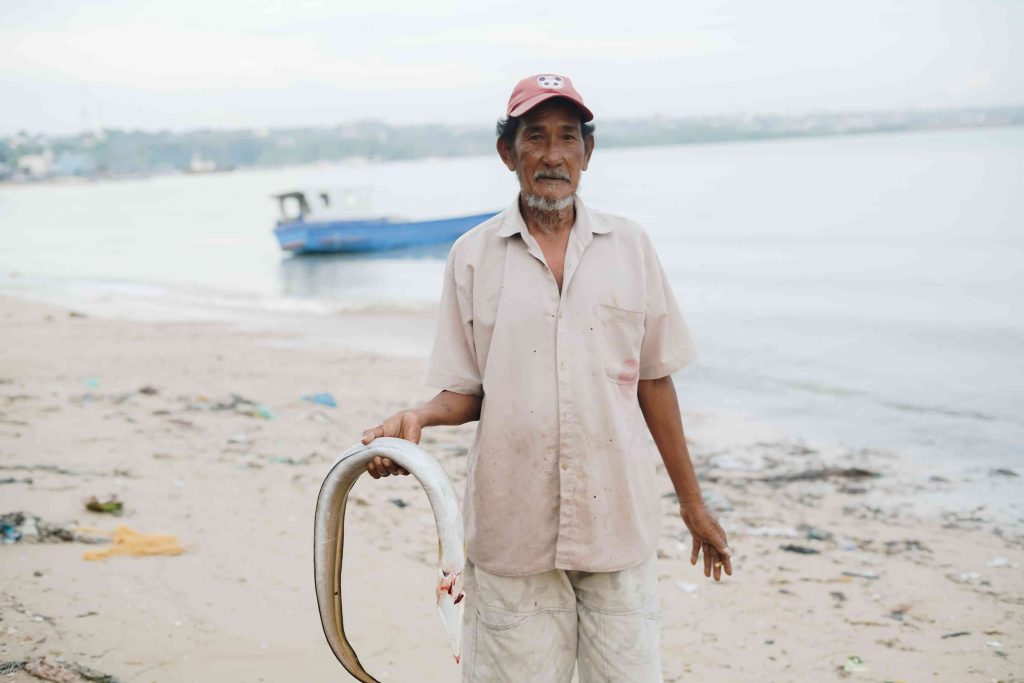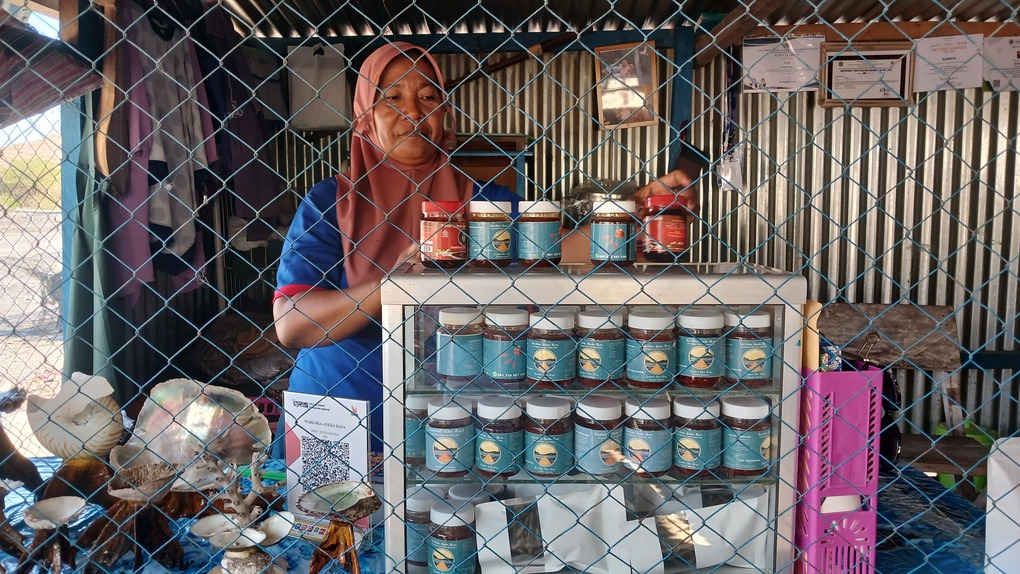Strengthening the backbone of Indonesia’s fisheries: A call to action
 by Rahmatika Febrianti and Rifki Akbari
by Rahmatika Febrianti and Rifki Akbari Jul 9, 2025
Jul 9, 2025 5 min
5 min
Small-scale fisheries in Indonesia face growing challenges. This piece calls urgent policy action to protect and support the blue economy. Small-scale fisheries and aquaculture (SSFA) in Indonesia face serious challenges including limited access to finance, outdated equipment, and climate change, threatening the livelihoods of millions.
“We used to be proud to be fishers, and life was not hard. My child will definitely not follow in his father’s footsteps; he is better off working on land than at sea.”
These somber words from Pak Suwardi, a small-scale fisher in Lamongan, East Java, ironically one of the country’s top fish producing regions, reflect the struggles facing small-scale fishers across Indonesia. Many small-scale fishers and aquaculture farmers throughout the archipelago are grappling with increasing economic, social, and environmental challenges that threaten their livelihoods, mirroring struggles faced by their counterparts in many parts of the world. As highlighted by the joint research on the Blue Food Assessment (BFA) conducted by MSC and Ministry of National Development Planning/National Development Planning Agency (Bappenas), these pressing issues demand urgent attention, particularly as Indonesia is finalizing the 2025-2029 National Medium-Term Development Plan (RPJMN).
Small-scale fisheries and aquaculture (SSFA) make up 85% of Indonesia’s fisheries sector and are essential to the value chain. They support food security, provide livelihoods for a significant portion of the population, and contribute to the sustainable management of aquatic resources. The Indonesia Blue Economy Roadmap 2023-2045 aims to elevate the contribution of marine and aquatic sectors to 15% of GDP and create jobs for 12% of the workforce by 2045.

However, small-scale fisheries and aquaculture (SSFA) in Indonesia face several challenges. Access to finance remains a significant barrier for SSFA, limiting their ability to upgrade equipment or invest in sustainable practices. Many prefer informal loans over institutional financing, which deepens their reliance on middlemen, who often act as key financial facilitators. During off-seasons, SSFA are forced to diversify their income, but limited skills and capital often confine them to low-paying jobs, such as basic fish processing or manual labor.
Resource and operational constraints have left SSFA’s potential largely untapped. Despite their significant numbers, small-scale fishers contribute only 20% of national fish catch. They face critical barriers in accessing affordable fuel for their boats and often rely on outdated equipment, limiting their access to more productive fishing grounds. According to our BFA findings, inefficiencies in fishing methods and inadequate storage exacerbate these issues, with up to 10 kg of fish per harvest lost to spoilage, especially on longer trips.
The aquaculture sector faces similar challenges, achieving only 30% of its potential production capacity. Farmers often lack access to affordable, high-quality seeds and feed, which are unreliable due to seasonal and weather fluctuations, price instability, and limited availability. Quality supplies are often prioritized for export. Access to subsidized fertilizers is also limited, as land-based agriculture takes precedence. Additionally, reliance on outdated equipment like fuel-powered aerators significantly raises operational costs. Alternatives such as electric aerators, have been found in our BFA research to reduce costs by as much as 60%.
The predominance of men in SSFA, coupled with an aging workforce and a lack of younger workers, threatens the future of the industry. Many young people from fishing families seek better opportunities elsewhere, leaving small-scale fishing at risk. Although women make up 42% of the workforce in Indonesia’s fisheries sector, their contributions often go unrecognized.
Traditional gender roles limit their involvement in fishing, and they are mainly engaged in pre- and post-harvest tasks. Societal norms and limited recognition as fishers prevent women from accessing resources and support, such as obtaining the KUSUKA card, the national fisher’s identity, limiting their potential to contribute more to the sector.
Climate change exacerbates Indonesia’s fisheries and aquaculture challenges. Sea surface temperatures (SST) have risen at an average rate of 0.19°C per decade over 33 years (Iskandar et al., 2020), outpacing global trends and severely disrupting ecosystems and productivity. Small-Scale Fisheries and Aquaculture (SSFA) are especially at risk due to inadequate access to advanced technology, financial support, and infrastructure.
The Notre Dame Global Adaptation Initiative (ND-GAIN) Country Index 2022 ranks Indonesia globally as the 97th most vulnerable and 99th most ready for climate change, underscoring its critical need for improved resilience and adaptive strategies to safeguard livelihoods and ecosystems.
Given this context, Indonesia must embrace a more robust approach to support SSFA communities. The government has already positioned the blue economy as a future growth engine and a pathway to sustainable fisheries in the 2025-2045 National Long-term Development Plan (RPJPN). This strategy promotes sustainable practices in marine and aquaculture, focusing on high-value products and innovation.
By boosting productivity and empowering communities, Indonesia aims to build a resilient fisheries sector that supports livelihoods and protects ecosystems, promising lasting benefits for the economy and biodiversity. Based on insights from our study with Bappenas, we offer five key policy recommendations to support and sustain Indonesia’s SSFA. These recommendations address pressing needs identified through our research and consultation with SSFA communities and stakeholders.
To lay a strong foundation, first, Indonesia must promote economic empowerment and improve market access for small-scale fishers. Drawing on lessons from the Coastal Community Empowerment Program (PMP-PPK), it is recommended to design comprehensive, integrated livelihoods diversification programs. By partnering with relevant government agencies, Indonesia can provide SSFA communities with additional sources of income, reducing their reliance on unpredictable fishing yields.
Second, strengthen resource access and operational efficiency. Expanding subsidy programs for high-quality inputs, such as fish feed, seeds, and fertilizers, will reduce operational costs for small-scale aquaculture farmers, especially those most vulnerable. Supporting local production and bulk purchasing for fishing cooperatives can further reduce dependency on costly intermediaries, enhancing the economic viability of SSFA. Global examples, such as India’s Pradhan Mantri Matsya Sampada Yojana (PMMSY) under India’s Blue Revolution scheme promotes sustainable aquaculture by providing subsidies and encouraging cooperatives to lower input costs for small-scale fish farmers.
Third, foster social inclusion and build capacity within SSFA communities. Increasing the reach of KUSUKA cards by enhancing public outreach and simplifying the registration process would extend critical social protections to more fishers, ensuring that vulnerable communities can access the support they need. Beyond financial access, this also means providing training and resources that empower women and underrepresented groups within the sector, unlocking the full potential of SSFA to drive local economic growth.

Lastly, ensure the continuity and sustainability of SSFA by developing and implementing a strategic succession plan. This initiative should include capacity building, youth-specific financial services, and leverage digitalization to engage the next generation in the sector. Embracing digital tools—from digital marketing and sales to automation in aquaculture to advance cultivation, and mobile financial services, can make the sector more accessible and appealing to young people, fostering a sustainable pipeline of skilled workers and leaders well into the future.
Addressing the challenges faced by small-scale fisheries and aquaculture is not just about economic growth, it is about safeguarding the food security, livelihoods, and cultural heritage of millions across Indonesia. By investing in these targeted actions, we can secure the future of Indonesia’s fisheries and aquaculture, ensuring that small-scale fishers like Pak Suwardi can envision a better future for themselves and their next generations.
Written by

Rahmatika Febrianti
Assistant Manager
Leave comments